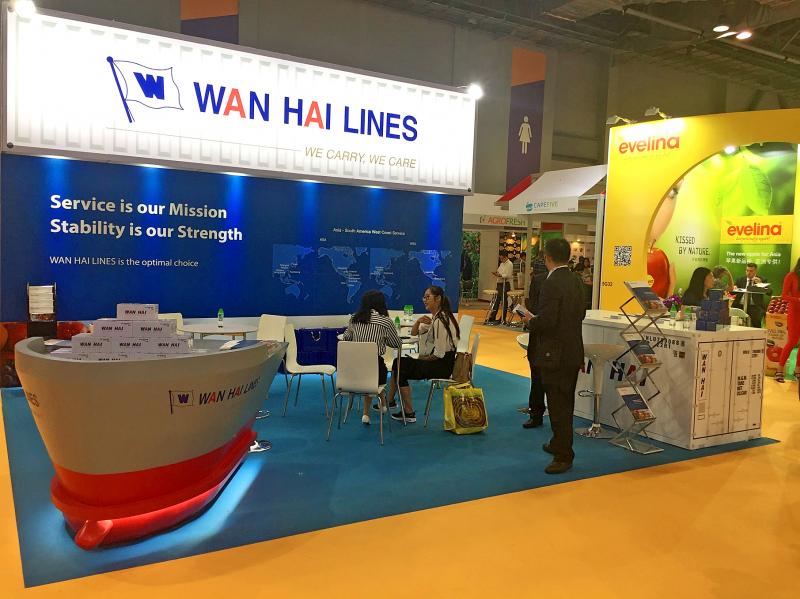Wan Hai Lines Ltd (萬海航運) has purchased 50,000 twenty-foot equivalent unit containers from China International Marine Containers Ltd (CIMC, 中國國際海運集裝箱) at a cost of US$141.73 million amid a global container shortage, the company said in a filing with the Taiwan Stock Exchange on Monday.
The average price of the containers would be US$2,835 per unit, Wan Hai said.
The company expects to receive the containers from the second quarter onward, Wan Hai spokeswoman Laura Su (蘇麗梅) told the Taipei Times by telephone yesterday.

Photo courtesy of Wan Hai Lines Ltd
Most of the new containers would be 40-foot high-cube containers, one of the most commonly used containers for ocean freight, Su said.
“It is difficult to predict when the container shortage would end, although some people expect the shortage to end after the Lunar New Year holiday,” Su said. “We hope to resolve the issue as early as possible with the purchase of new containers.”
The shortage was caused by many containers piling up at ports or being “in the wrong places,” due to congested seaports and reduced personnel amid COVID-19 lockdowns worldwide, Su said.
Therefore, containers have been taking longer returning to their places of origin, which disrupted the logistics chain and caused concerns for Wan Hai’s customers, she said.
The purchase is not a particularly big order for Wan Hai, as the shipper buys new containers with a similar combined capacity every year, Su said.
However, it came earlier than expected, as Wan Hai had bought 37,000 containers in October last year from CIMC for US$109 million, she said, adding that the company has begun taking delivery of some of those containers.
The average age of Wan Hai’s containers is 4.3 years, lower than the global average of 6.6, she said.
The shortage has driven up sea freight rates, which boosted Wan Hai’s revenue last quarter to a record NT$11.6 billion (US$408.31 million), up 75 percent year-on-year.
Wan Hai has a rosy outlook for its orders leading to the Lunar New Year holiday, but the post-holiday outlook remains unclear, Su said.
Wan Hai owned 66 ships and was chartering 39 ships as of Sept. 1 last year.
Intra-Asian routes contributed 70 percent to its total revenue, followed by Middle Eastern and Indian routes with 20.6 percent. The US and South American routes accounted for 5.6 percent and 6.6 percent respectively, company data showed.

CHIP WAR: Tariffs on Taiwanese chips would prompt companies to move their factories, but not necessarily to the US, unleashing a ‘global cross-sector tariff war’ US President Donald Trump would “shoot himself in the foot” if he follows through on his recent pledge to impose higher tariffs on Taiwanese and other foreign semiconductors entering the US, analysts said. Trump’s plans to raise tariffs on chips manufactured in Taiwan to as high as 100 percent would backfire, macroeconomist Henry Wu (吳嘉隆) said. He would “shoot himself in the foot,” Wu said on Saturday, as such economic measures would lead Taiwanese chip suppliers to pass on additional costs to their US clients and consumers, and ultimately cause another wave of inflation. Trump has claimed that Taiwan took up to

A start-up in Mexico is trying to help get a handle on one coastal city’s plastic waste problem by converting it into gasoline, diesel and other fuels. With less than 10 percent of the world’s plastics being recycled, Petgas’ idea is that rather than letting discarded plastic become waste, it can become productive again as fuel. Petgas developed a machine in the port city of Boca del Rio that uses pyrolysis, a thermodynamic process that heats plastics in the absence of oxygen, breaking it down to produce gasoline, diesel, kerosene, paraffin and coke. Petgas chief technology officer Carlos Parraguirre Diaz said that in

Japan intends to closely monitor the impact on its currency of US President Donald Trump’s new tariffs and is worried about the international fallout from the trade imposts, Japanese Minister of Finance Katsunobu Kato said. “We need to carefully see how the exchange rate and other factors will be affected and what form US monetary policy will take in the future,” Kato said yesterday in an interview with Fuji Television. Japan is very concerned about how the tariffs might impact the global economy, he added. Kato spoke as nations and firms brace for potential repercussions after Trump unleashed the first salvo of

SUPPORT: The government said it would help firms deal with supply disruptions, after Trump signed orders imposing tariffs of 25 percent on imports from Canada and Mexico The government pledged to help companies with operations in Mexico, such as iPhone assembler Hon Hai Precision Industry Co (鴻海精密), also known as Foxconn Technology Group (富士康科技集團), shift production lines and investment if needed to deal with higher US tariffs. The Ministry of Economic Affairs yesterday announced measures to help local firms cope with the US tariff increases on Canada, Mexico, China and other potential areas. The ministry said that it would establish an investment and trade service center in the US to help Taiwanese firms assess the investment environment in different US states, plan supply chain relocation strategies and